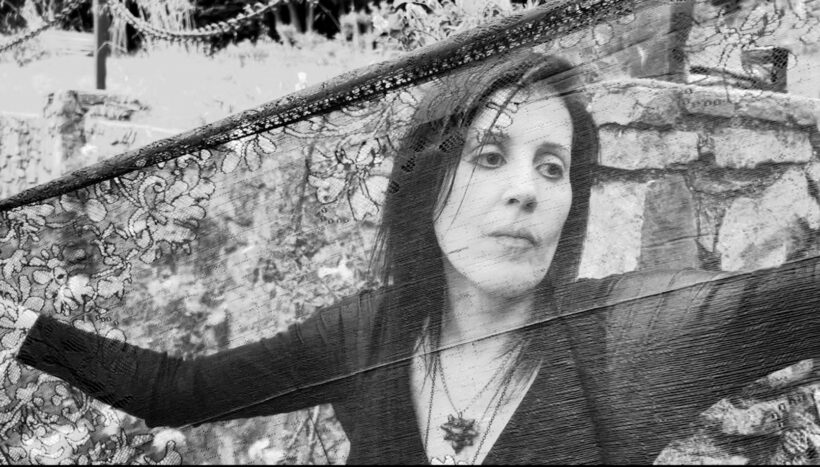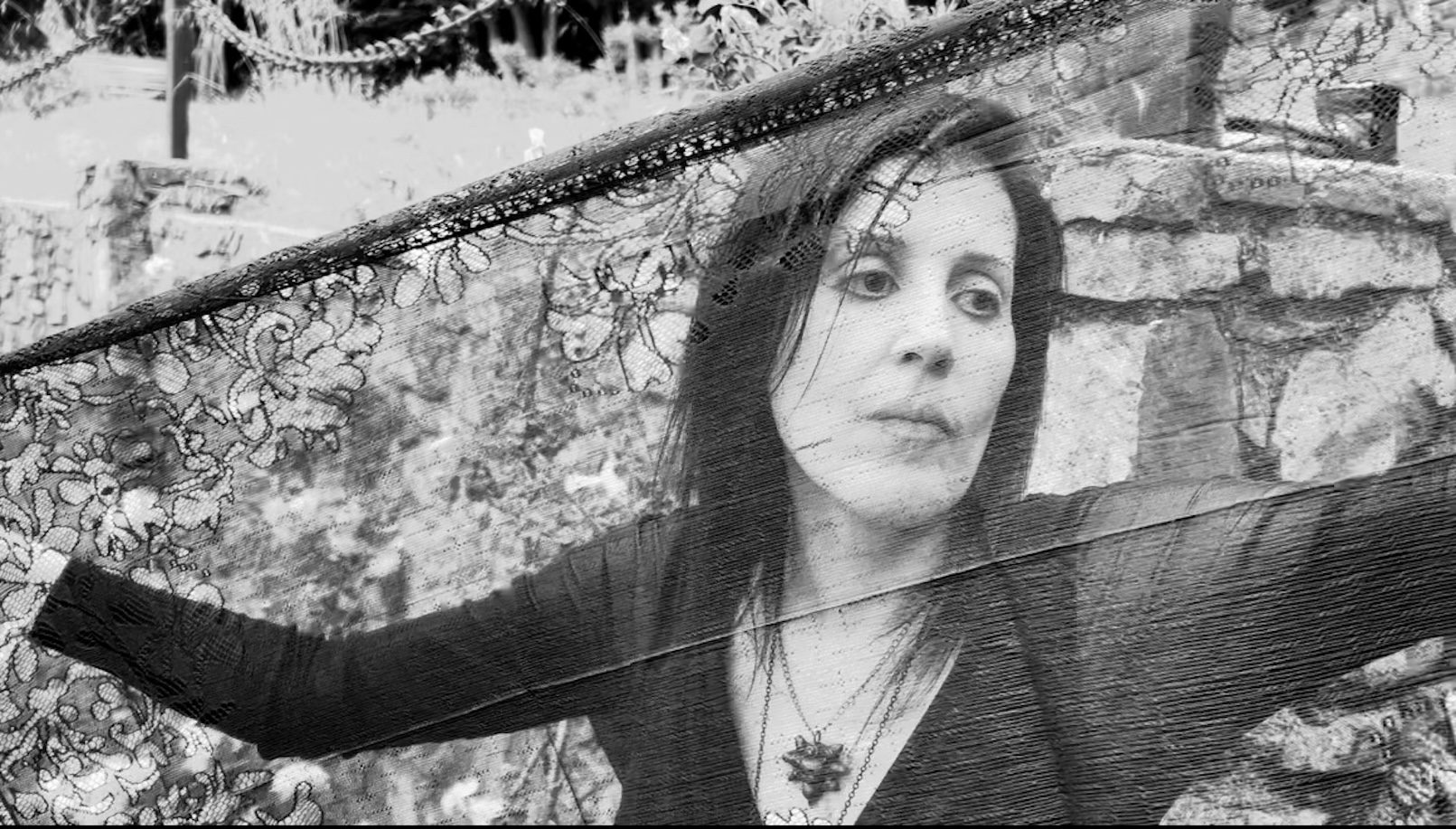
Leila Abdul-Rauf is one of the most formidable living death metal musicians and a brilliant experimental composer who, for years, has built a musical identity outside of the heavy with her solo work. Her fifth solo album, Calls From A Seething Edge, is her best solo work. It was written during a time of global and domestic unrest, the ascendance of fascism in the United States and Europe, and war in Gaza. It’s an album that combines disparate cultural threads and traditions to tell a story about humankind perched on the edge. She talked to us about making order out of chaos and Vastum’s first appearance at Decibel Metal & Beer Fest Philly in April 2025.
I like challenging listening, but this album felt more accessible to me. Was this intentional?
The shift was intentional. This is my fifth solo album, and I thought it was time for a change. The first four albums are almost sleepy, which can be difficult if you like active and rhythmic music. Playing live was part of this shift.
What did you hear live that took you in this direction?
I am primarily known for my metal band and play metal shows. I am used to those spaces. If I am going to keep people’s attention, I thought shifting to a more rhythm-heavy music style would be more engaging live. Metal shows are much louder than experimental shows, often held in galleries or churches. At a club or bar, the louder, the better.
What does the album title refer to?
When I wrote the first track, I envisioned humanity walking this line between the concrete and spirit world or life and death. The line was like a sharp blade. I couldn’t get the image of a sharp blade out of my mind. The title came as I wrote the lyrics, and it seemed like a great theme.
Was the title also influenced by what is going on in the world?
The world is nuts right now. There are so many wars going on. People live in their own worlds and deny other people’s worlds. I needed an outlet for all the rage and frustration. It went into this album.
Language, shared stories, and culture are so important to society. We seem to have lost that sense of collective consciousness.
That’s an interesting observation. Maybe subconsciously, I was making order out of chaos. There is so much detail on this record; maybe some of that is a desire to create an elaborate world out of chaos. My first four records were introspective and went inward. I tried to get everything out of me and into the collective on this record.
Am I correct in thinking you leaned into your cultural heritage on this album?
The folk traditions that I drew from are multifaceted. My ethnic background is mixed. I’ve noticed that people from outside Arabic culture hear Arabic influence. People from the Arabic world hear the northern European sounds. My sister said some of the album sounded Nordic. There is so much sharing of folk traditions and music the further back in history you go. I was trying to meld traditions into one album. From track to track, it sounds different. I don’t think any two tracks sound alike.
So, what ties the record together?
It’s thematic cohesion. “Summon” and “The Summoned” bookend the album. What I did with “The Summoned” was tie together all the themes in the album in one place. You can hear the guitar part in “Summon” and a dulcimer line from “Mukhalafat.” I put it all together on the last track. That is the proof that these themes all fit together.
I love it when artists use themes. I’m thinking of Hüsker Dü and the songs “Dreams Reoccurring” and “Reoccurring Dreams” on Zen Arcade. Those songs bookend the album and give it this epic arc.
Exactly. I tried several of the themes in that short space. I looked at it as all your memories shooting by you in your last moments.
Like “Rosebud” in Citizen Kane.
That’s a good example—or Jacob’s Ladder (laughs).
With Vastum, you put songs together around riffs. How do ideas or themes come together for you in more experimental music?
My process with solo records is to make three mother tracks. Three songs are like paint thrown on a wall. Those are the kernels of the album. My job is to draw themes from these songs and make other songs out of them. I take the theme, strip it down, and add different elements. It’s not linear like writing death metal, where one riff comes after the other and vocals come at the end. With solo writing, things happen in parallel. I often have songs that are wholly done and then songs that are almost sketches. Over time, the album becomes whole.
Do you add lyrics later, or are lyrics part of the world-building for solo material?
Sometimes, I write lyrics first. That is rare in Vastum. It’s more common to write lyrics and write songs around the lyrics. For “Depths of Us,” I had lyrics first and wrote around them.
The second track is named “Mukhalafat.” Is that Urdu?
It’s a term also used in Farsi and other languages. It means antagonism. The song is instrumental. Instrumentals are hard to name because there are no lyrics. This is the folksiest song, and if there is an Arabic influence, it’s in this song. I wanted a word that would be evocative and make you feel something.
You recently performed at the Arab America Museum in Dearborn, Michigan.
I was contacted by the director of the Temescal Art Center, who runs an organization called Arab.AMP. She contacted me about performing at an art space in Philadelphia, and I was simultaneously invited to Dearborn. It was a wonderful experience and so professionally run.
And not in a shithole bar like a metal show.
(laughs). As a solo artist, I’ve played in every event venue imaginable: the woods, anarchist spaces in Scandinavia, churches, galleries, metal bars, you name it. I am adaptable to spaces. When I play something like a museum, I feel spoiled. We got a thorough soundcheck, and everyone was there to see us. They aren’t there to drink or see their buddies.
Vastum is joining us in Philadelphia next spring. You go way back in Decibel events and were a panelist at the Choosing Death Fest in 2016.
Our PR agent, Dave (Brenner), heard we had a live lineup together and suggested we contact Albert about the fest. So I did. He responded right away, and now we are on it. We were also available to tour, so we will do a two-week East Coast tour around Decibel Metal & Beer.
What did you learn about yourself while writing this album?
I never have to stop where I am. I can keep growing as a composer and performer. There are always new ways to reinvent yourself.



